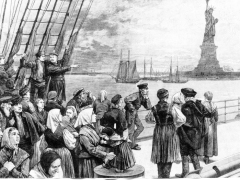There has been a lot of talk lately about young celebrity women who say they aren’t feminists and associate feminism with hatred of men, being portrayed as victims and oppressed, not appreciating motherhood, not accepting differences between men and women and so forth. See the postings on tumbl as an example. I’m not a woman so I don’t have a right to define what feminism is or to lecture young women about which labels are right for them. They have to choose their own labels. But I am a guy who defines himself as a feminist. So I thought it might be worth weighing in on why a guy might call himself a feminist.
I see myself as a feminist because I am committed to issues of fairness and equality for women. I don’t have to be a woman to be a feminist, just as I don’t have to be African American to promote the end of racial discrimination. I happen to be Jewish and that is one of the factors that probably made me sympathetic in my life to the issues of minorities who were suppressed (and to feel such pain over what Israel is doing to Palestinian civilians). Of course I am many other things too that shape who I am and my commitments. I am white, an ex academic, an executive in the software industry, a father, and so on and so on. So there are many labels that I apply to myself as a description of who I am and what my commitments are. Feminist is one of them.
For me, feminist means that as a man I am both committed to women being treated and recognized as talented, smart, and capable as men, and being recognized for that equality. To me, feminist is a way of taking on the “all men are created equal” phrase, which though a vision of equality at our American founding, implicitly excluded many groups, including women, blacks and gays (and maybe even Jews).
I personally first took on the label “feminist” when I was in Seminary (rabbinical school) in the late 1970’s and realized that despite the commitment to tradition and change in the Jewish Conservative movement where I was studying, women at that time were not permitted to be ordained. Women still can’t be priests or orthodox rabbis today. I was outraged, especially as I had been drawn to the movement because of what I thought at the time were progressive ideas about religious tradition and change. Pressures from students and Jewish congregations successfully changed that position back in the early eighties. My former wife in fact became the first woman ordained as a Conservative rabbi and women rabbis is now a commonplace in the Conservative movement.
After leaving Seminary, I spent a good part of my academic career as a professor of Religious Studies and was keenly influenced during that time by feminist understandings of culture, literature and religion. Women’s Studies and feminist theory fundamentally transformed how academics in the university understand nearly every aspect of human culture and history. One can argue that at times feminist theory, like any theoretical framework, can go too far and make a caricature of itself. But I remain convinced that feminist analyses fundamentally changed how we understand culture and power relations. The realization that gender is a symbolic code through which deep power relationships are expressed revealed new ways of understanding culture, religion, politics and the classic texts of the West. The now commonplace insight that God is often cast in masculine imagery (even when God was imagined without a body and without “sex”) was a critical insight of feminists and feminist academics in religious studies, the field in which I was working. I was so influenced that I even wrote a book myself about how masculine images of God might impact men.
I left academics in the mid 90’s and entered the high tech business world of the Internet boom. One doesn’t have to be here long to realize that the progress that feminism made in the university had not yet made it very far in the business world. I haven’t tracked all the statistics about the glass ceiling but my own personal observations and conversations with my business colleagues who are women make it clear that there is still a long way to go for women to have the same prestige, salaries and impact as men. Some companies are more accepting of women’s contributions than others. I think of HP which has many more women in senior positions (even two CEO’s in recent memory) than other companies in Silicon Valley. But the percentage of women who are CEO’s and in senior executive positions is still far below that of men.
I also have a daughter who is now in her twenties. I’m proud of my generation that we “feminists” were able to make some significant positive change. She enters a world at least here in the US that is more comfortable with women with power and that women can make equally important contributions. Women, of course, have just as much right to choose to stay at home, be a Mom, as pursue a career. Equality means they have the choice, not society or some expectation of who or what they can be. Who knows we may even have a president who is female one day soon too. The work is not done. Here in the US and abroad in other countries, the impulses that associated masculinity and maleness with being smarter, more rational, and better are still present. Women still don’t get equal pay for equal work. Women still can lose some of their healthcare benefits because of religious backlash (e.g. Hobby Horse).
That is why I still think of myself as a feminist. There is more work to do, just as there is more work to do, not just for women, but fighting racism, homophobia, antisemitism, violence against Palestinians, and all the other unfair practices and ideologies that stereotype people because of differences.
I can’t say whether young women should call themselves feminist. I understand that in many ways that the progress we have made has made the term less meaningful for them. The earlier definitions of feminism don’t speak to them and don’t embrace the broad range of interests and values they have. But I encourage them, if they don’t like the term feminist, to find another label that they can get behind, that describes their commitment to the fight against the various forms of bigotry and hate that are present in society and that keep people from having choices and fulfilling their full potential, whatever they may define that to be.




